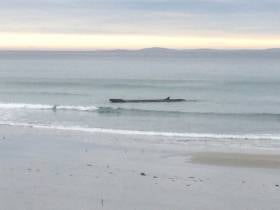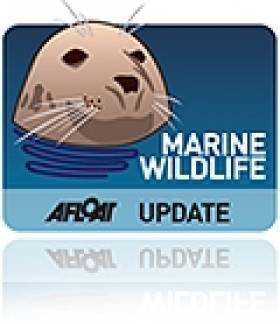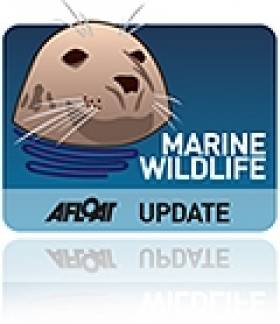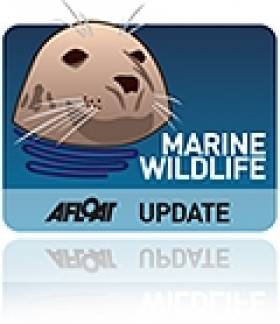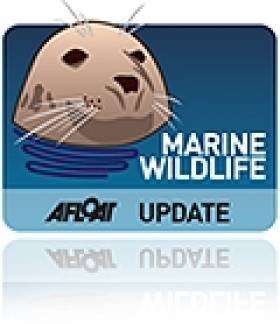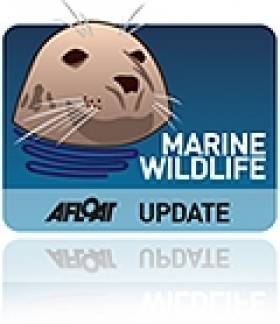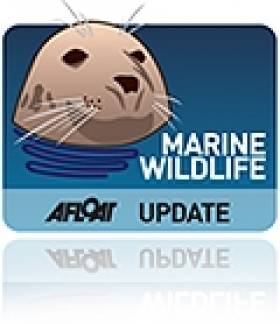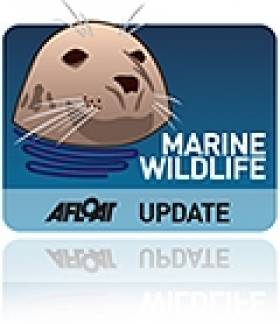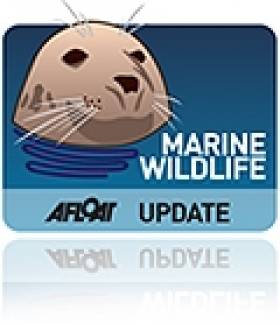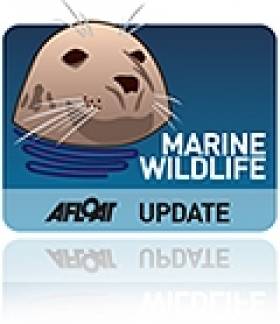Displaying items by tag: stranding
Large Whale Stranding On Mayo Beach
#MarineWildlife - The Irish Whale and Dolphin Group (IWDG) received a report at the weekend of a large baleen whale struggling in the shallows at Cross Beach in north-west Co Mayo.
The 12-metre marine mammal, thought to be a sei whale or fin whale, was ushered back into deeper waters by a group surfing in the area on Sunday 27 November.
But locals are urged to keep a lookout over the next few days as the whale, believed to be injured or in poor health, is likely to strand again.
Stranded Dolphins Saved By Kerry Locals
#MarineWildlife - Common dolphins stranded in a Kerry river last weekend were saved by the quick actions of local people, as The Kerryman reports.
Trapped by the fast receding tide at the mouth of the Cloghane Estuary on the Dingle Peninsula last Saturday (20 June), the group of dolphins were fortunate they didn't have to wait long for the community to spring into action.
Following a report from local woman Shelia Mulcahy, Louise Overy of Dingle Oceanworld and her sister Tabitha co-ordinated efforts that involved area fishermen and landlubbers alike, keeping the dolphins wet till enough people arrived to help move the protected marine wildlife back into deeper waters.
The Kerryman has more on the story HERE.
New Zealanders Rush To Aid 200 Whales In Mass Stranding
#MarineWildlife - Locals have been astounded by a mass stranding of up to 200 pilot whales in New Zealand.
According to the Irish Independent, volunteers were yesterday (13 February) fighting to save the whales that were still alive after beaching along a 7km stretch of sand at the north end of New Zealand's South Island.
The death toll was last put at around 25, and while some other were reportedly refloated, they were said to be "swimming in a confused fashion" as the Guardian reports.
Farewell Spit, where the stranding has occurred, is said to be a 'whale trap' for its numerous cases of cetacean strandings - bringing to mind the recent "unusually large number" of whale beachings in Scottish and Irish waters.
Farmer Rescues Stranded Dolphin Calf In Galway Bay
#MarineWildlife - A juvenile dolphin was saved after stranding in the shallows at Maree on Galway Bay thanks to the swift actions of a local farmer.
As the Galway Advertiser reports, Martin Costello waded out into the inlet at Ballinacourty - a notorious spot for marine wildlife strandings - to pick up the young cetacean and carry it out to deeper water, from where it was able to swim out to safety.
Such human intervention was invaluable in the rescue of an ailing seal pup that was found alone on a beach in Connemara at the weekend.
According to the Irish Mirror, the infant seal was taken to Seal Rescue Ireland in Athlone, where staff have named him Sea Noodle and are nursing him back to health, though a serious chest infection means he's not out of the woods yet.
Whale Rescued In Meath Stranding Drama
#MarineWildlife - Skerries RNLI joined a number of groups in assisting a beached whale back out to sea at Gormanston in Co Meath earlier today (Thursday 20 June).
The volunteer lifeboat crew launched their inshore lifeboat shortly after 10am following reports from the Irish Whale and Dolphin Group (IWDG) that a 25ft pilot whale had beached in the area.
The lifeboat helmed by Joe May, and with crew members Emma Wilson, AJ Hughes and Laura Boylan onboard, made its way to the scene where May got into the sea and helped manoeuvre the whale back into deeper water.
Skerries RNLI then shadowed the whale guiding it out to sea, preventing it from turning back to shore by positioning the boat in its way. The lifeboat did this for about 25 minutes until the mammal was well clear of the shore.
Other agencies on scene included Skerries coastguard, the Defence Forces based at Gormanston, the IWDG, Boyne Fishermen’s Rescue and Irish Coast Guard helicopter Rescue 116.
Meanwhile, RTÉ News reports that a second whale was found dead on the beach near Mornington, north of Bettystown.
Despite initial fears that the whale was the same one rescued in the morning, it was later determined to be a different creature.
Beaked Whale Strandings Total 3 For May
#MarineWildlife - Another beaked whale stranding has been recorded on the Irish coast just weeks after two of such creatures were found in Donegal.
A ranger with the National Parks and Wildlife Service (NPWS) made the discovery at Aillebrack in Co Galway on the evening of 27 May.
The 5m carcass of a female - like the female and juvenile found in the northwest - is thought to be either a True's or Sowerby's beaked whale.
Mick O'Connell, strandings officer with the Irish Whale and Dolphin Group (IWDG), says the latest stranding "raises new questions", with suspicion that its death may be linked to the face of the Donegal pair earlier this month.
As previously reported on Afloat.ie, beaked whales are a rare occurrence in Irish waters, with the last record before this month' stranding made in 2009.
Dolphins 'Say Thank You' After Fish Farmer Rescue
#MarineWildlife - Two dolphins saved from stranding on a beach in Donegal leapt from the water "as if to say thank you" after their rescue by a local fish farmer.
The Belfast Telegraph reports that salmon farmer Shea Coyle and his father Michael acted quickly after noticing what at first looked like two upturned surfboards on Downings beach near Fanad.
But what looked from afar like surfboard fins turned out to be the fins of two dolphins that had become trapped in the sand.
Shea described how the dolphins were "trying desperately to wriggle free" before he leant a hand to heave them back into the water.
"After about 10 minutes I got one dolphin safely out into deeper water and he stayed there whilst I got to work on the other."
Once the second dolphin was free, the pair "just took off" - and were later seen by the Coyles from a nearby peer, giving what might just have been a show of thanks.
The happy story in Donegal occurred not long after a series of dolphin and whale strandings in the northwest described as "unusual" by the Irish Whale and Dolphin Group (IWDG).
'Unusual' Dolphin, Whale Strandings In Northwest
#MarineWildlife - Seven dolphins and two beaked whales have stranded on beaches in the northwest in events described as "unusual" by the Irish Whale and Dolphin Group (IWDG).
On the Mullet Peninsula, a group of seven common dolphins - comprising five adults and two juveniles - live stranded at Tarmon Beach on Sunday 12 May.
Though initial attempts to refloat them were successful, one of the juveniles was later found dead and the other was euthanised due to poor health.
Meanwhile in Donegal, the fresh carcass of a female True's or Sowerby's beaked whale was found on Sunday evening on Five Fingers Stand at Inishowen - some days after a reported live stranding of a Sowerby's beaked whale on the Welsh coast.
The Inishowen stranding was followed yesterday 14 May by the discovery of a dead beaked whale calf at Trawbreaga Bay, in what is believed to be a connected stranding.
Samples of the adult female were taken in order to confirm the species, either of which would mark a rare cetacean record for Ireland - the first since 2009.
Recent Dolphin, Whale Strandings 'Very Unusual' Says IWDG
#MarineWildlife - The Irish Whale and Dolphin Group (IWDG) has described as "very unusual" a mass stranding of common dolphins on Achill Island last week - which was followed this week by the remains of cetaceans washed up in Kerry.
At least eight common dolphins were found dead on Keel Beach, Keem Beach and Dookinella on the Co Mayo island at the end of January.
And The Irish Times reports that two pilot whales and an "otherwise healthy" dolphin were found washed up at Cuas Croom near Cahirciveen in the last few days.
Commenting on the former incident, IWDG stranding officer Mick O'Connell said: "While there are occasionally live strandings involving groups of dolphins, it is very unusual in this country to see this number of dead dolphins washed ashore over a 10km area."
Strandings of deceased dolphins have also been reported in Donegal, and the IWDG's Simon Berrow suggests that the recent severe weather experienced around Ireland's coast may be a factor.
16 Pilot Whales Die in Scotland Mass Stranding
#MARINE WILDLIFE - Marine wildlife experts are investigaing the causes of a mass stranding of pilot whales at Fife in eastern Scotland at the weekend.
The Press Association reports that 16 whales from a 26-strong group died when they stranded on a beach near St Andrews on the morning of Sunday 2 September. Three of those that died were calves.
More than 50 volunteers assisted members of the RNLI and vets from British Divers Marine Life Rescue (BDMLR) in refloating the other 10 whales at high tide yesterday afternoon, in what BDMLR co-ordinator Ali Jack described as "a fantastic effort".
Rescuers used specialist pontoons brought in from across Scotland as well as Newcastle and Cumbria in northern England.
According to The Guardian, some 24 whales from the same pod were spotted in the shallows further along the coast at Cellardyke and are under close observation.
A Forth coastguard spokesman said that vets would return to the beach this morning to carry out post-mortems on the whale carcasses to find any indication of what might have caused them to come so close to the shore.
The spokesman told The Guardian: "It is a very rare occurrence in Scotland and very sad. The usual scenario would be that the whale that is leading the group has become ill, or has lost its way, and gets beached and the rest will follow on, although we do not know for sure if that is what happened."
The incident brings back memories of last year's mass stranding of 44 pilot whales in the Scottish Highlands, as previously reported on Afloat.ie.
Twenty-five whales from that pod died at the Kyle of Durness, in a tragedy that mirrored the deaths of 33 whales in a similar mass beaching in Donegal in late 2010.



























